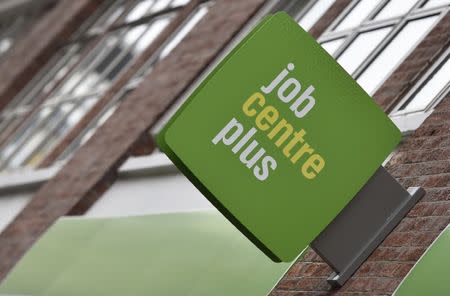UK jobless rate rises unexpectedly, wage growth steady
By Andy Bruce and William Schomberg
LONDON (Reuters) - Britain's jobless rate rose for the first time in almost two years at the end of 2017 and pay growth remained modest, keeping the Bank of England waiting for an acceleration in wages that would justify a new interest rate hike.
British government bond prices rose and sterling briefly fell against the U.S. dollar after Wednesday's figures showed the sharpest rise in the number of people out of work in almost five years.
Nonetheless, the data painted a mostly robust picture of the labour market, with productivity - a major weakness of Britain's economy over the last decade - recording its best performance since the 2008-09 recession in the second half of 2017.
British households lost spending power last year due to a jump in inflation, caused by the post-Brexit vote fall in the pound, and only weak wage growth.
The BoE expects pay to pick up soon, a big reason why it says interest rates are likely to rise faster and to a greater extent than it thought until recently.
Economists were split on whether the latest data made an interest rate hike in May more likely.
"If stronger productivity continues into 2018, the Bank of England may decide to hold at least once on raising rates this year," said Yael Selfin, chief economist at accountancy KPMG.
BoE Governor Mark Carney and other officials are to speak in parliament at around 1415 GMT.
The ONS said the unemployment rate rose to 4.4 percent from 4.3 percent in the three months to December, the first increase since the three months to February 2016, and the number of jobless rose for a third monthly report in a row.
The ONS attributed the rise in unemployment to a fall in the number of people who are neither working nor looking for a job.
However, the number of people in work grew by less than expected, rising by 88,000, about half the consensus forecast in a Reuters poll of economists.
SUBDUED PAY GROWTH
Growth in employment has been one of the bright spots in Britain's economy since the financial crisis but as in many other countries pay growth has been anaemic.
Workers' total earnings, including bonuses, rose by an annual 2.5 percent in the three months to December, as expected and unchanged from the three months to November.
BoE officials are likely to note pay jumping 2.8 percent in December alone. But that was still weaker than the 3.0 percent reading of British consumer price inflation for December.
Excluding bonuses, earnings rose by 2.5 percent year-on-year against expectations for a 2.4 percent rise.
BoE policymakers will be watching closely for signs that employers - who have found it harder to recruit workers since the 2016 Brexit vote - have offered improved pay settlements at the start of the year.
The ONS said the number of EU nationals working in Britain rose by an annual 4.5 percent over the fourth quarter, the smallest increase since the third quarter of 2013. The number of Eastern European workers fell.
Overall migration data has shown a drop in net migration from the EU into the UK since the Brexit vote.
Separate ONS figures showed finance minister Philip Hammond likely to meet his target for cutting Britain's budget deficit this year with room to spare.
The government recorded a January budget surplus of 10 billion pounds, slightly above forecasts, helped by strong income tax receipts which typically jump in that month.
With only two months left in the 2017/18 financial year, cumulative borrowing now stands at 37.7 billion pounds, down 16 percent on the same point a year ago.
In November, Britain's Office for Budget Responsibility forecast borrowing of 49.9 billion pounds for the full year. On Wednesday it said it now looked clear that Hammond would undershoot this "by a significant margin".
The finance ministry said Wednesday's figures were strong.
(Editing by Toby Chopra and Gareth Jones)

 Yahoo News
Yahoo News 

